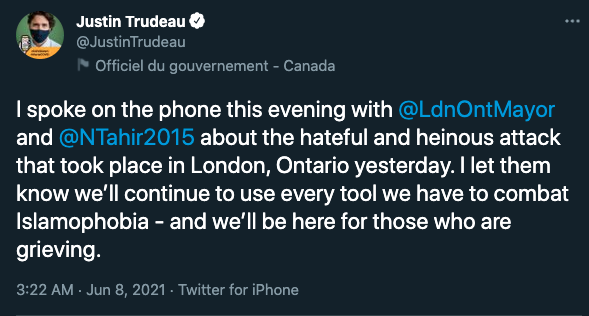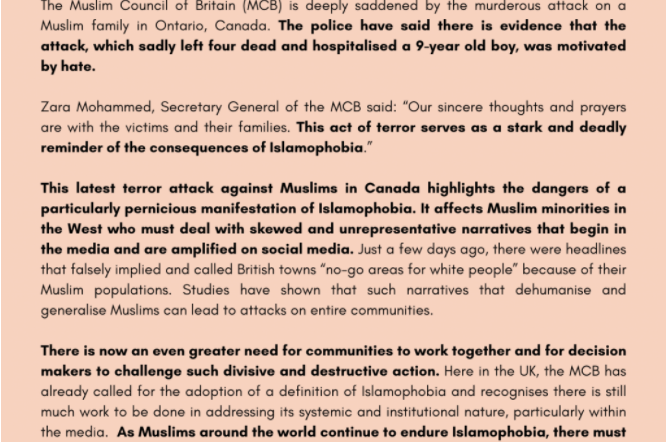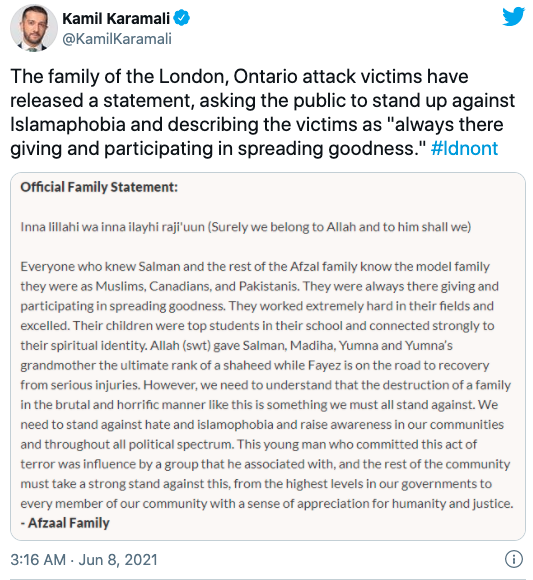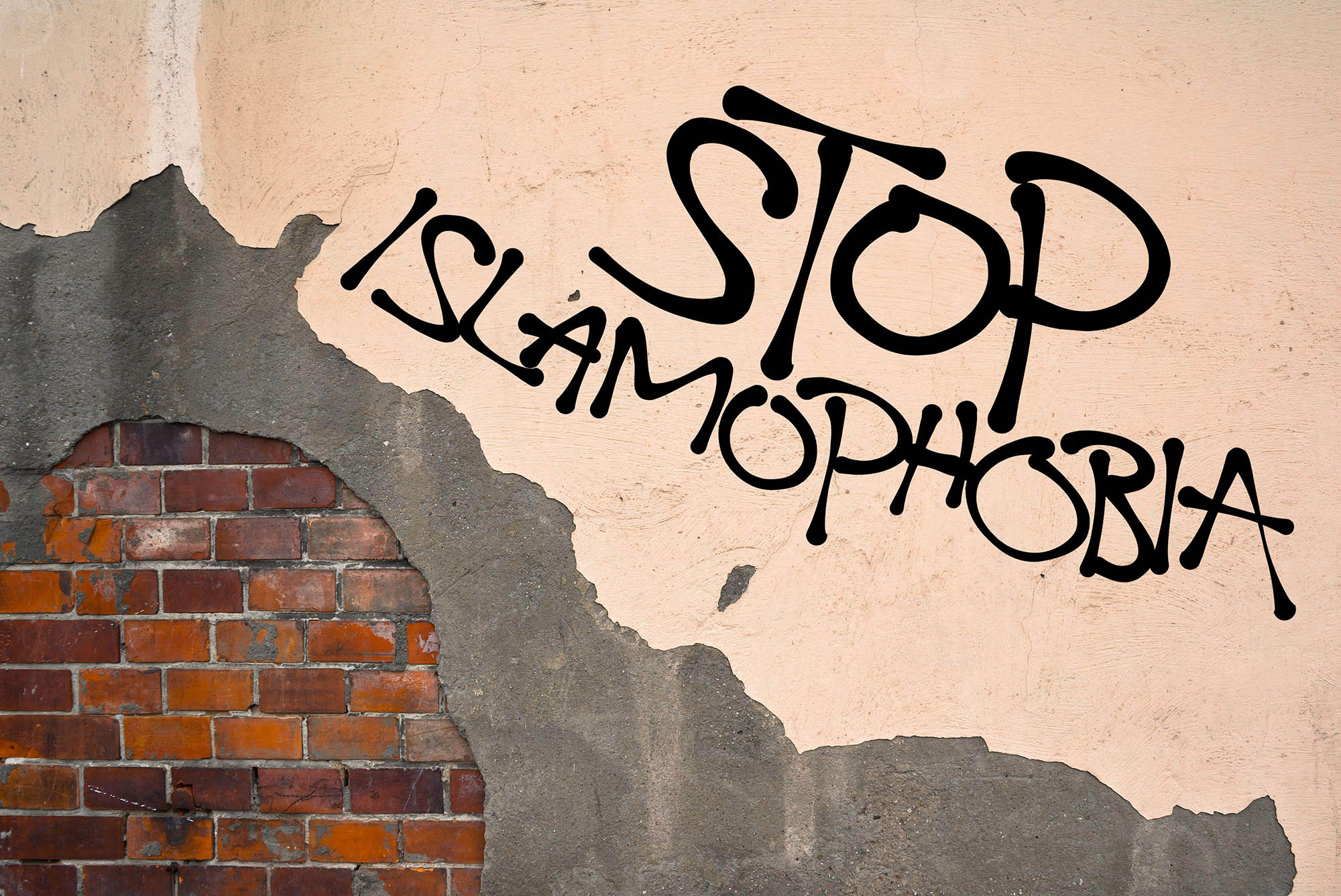On the 6th June 2021, four members of a Muslim family – spanning three generations – were killed in a premeditated attack in London, Ontario, Canada. Only one member of the family, a nine year old boy, survived. It is the largest attack in London’s history1, and the worst attack against Canadian Muslims since the 2017 Quebec City Mosque shooting, where six people were killed2. Following the official police statement denouncing the attack as an “act of unspeakable hatred”3 that specifically targeted Muslims4, Canadian prosecutors have upgraded the four counts of first-degree murder to a terrorism charge. Chrystia Freeland, the Canadian deputy prime minister, reacted to these new charges, by stating: “it is really important for us to name it as an act of terror … and it is important for us to identify the terrible threat that white supremacism poses to Canada and to Canadians”5.
The incident has spurred a worldwide response, with nationwide events being held in solidarity. An in person vigil was held on the 9th June 2021 in Bayfront Park, London, Ontario for example, by supporters and members of Hamilton’s Muslim community. Whilst support has been towards London’s Muslim community, many Muslims have argued this is not enough. Instead, further discussions about the rise of Islamophobia in Canada, and what is being done to tackle it, are needed6.
Responses to the Attack
Following the incident, London Mayor Ed Holder declared that the attack was “an act of mass murder perpetrated against Muslims”. He further urged people to respond with “acts of compassion, acts of kindness, acts of humanity, acts of solidarity, empathy and justice”7. Similar sentiments have been echoed by the Calgary Mayor Naheed Nenshi and Prime Minister Justin Trudeau, who have both condemned the attack. In a statement on Twitter, Trudeau tweeted that having spoken to Ed Holder (London Mayor) and Nawaz Tahir (a lawyer and Muslim community leader), “we’ll continue to use every tool we have to combat Islamophobia – and we’ll be here for those who are grieving”.

Politicians from all levels of the Canadian government accompanied thousands of citizens to the “pathways of hearts”, vigil held to honour the Afzaal family and to protest against hatred on the evening of the 8th of June. The vigil was held at Canada’s second-largest mosque. The vigil started with the Muslim call to prayer, which for the first time in Canadian history, was aired on national television8. A moment of silence was then held at 8:40pm to mark the time of the attack two days previously.
During the vigil the Prime Minister addressed the crowds, and told them “Islamophobia is real. Racism is real”8. He was met with a muted response. Other politicians who addressed the crowd, such as the Conservative party leader Erin O’Toole – who in 2017, voted against a non-binding motion condemned ‘Islamophobia and all forms of systemic racism and religious discrimination – and Ontario’s Conservative Premier Doug Ford, were met with hostility. O’Toole’s message focused on a commitment to “working across party lines. With premiers, with mayors, with faith leaders to end the kind of violence and hatred that took these lives”9. Jagmeet Singh of the New Democratic Party however, was met with cheers amidst the crowds at the vigil. “We will not let terror win” he told mourners, and like many others at the vigil emphasised words are not enough: “What we need to do now is real action after this act. How many more lives have to be taken before we act? How many more Muslim brothers and sisters have to lose their lives before real change is put in place? We need real action”10.
Earlier that morning, Trudeau had addressed the Canadian House of Commons with the following statement: “This was a terrorist attack, motivated by hatred, in the heart of one of our communities. If anyone thinks racism and hatred don’t exist in this country, I want to say this: How do we explain such violence to a child in hospital? How can we look families in the eye and say Islamophobia isn’t real?”11. This was similar to the speech he delivered after the attack at a Quebec City Mosque back in 2017, during which he declared that “such an act of violence has no place in Canadian society”12.
Javeed Sukhera, a psychiatrist and chair of the London, Ontario, police board expressed that “stories like this shatter people’s utopian image of what Canada is”13. He further added that “denial of racism in Canada is pathological. But how many more people have to die before politicians do something?”14. This sentiment has been raised by many Muslim organisations and further members of the Canadian community. Mohammed Hashim, executive director of the Canadian Race Relations Foundation, who also attended the vigil, similarly stated that “policymakers need to accept responsibility that this is an environment they have allowed to exist in Canada, whether its on the streets or online”15. For Hashim, despite the fact “Canada has always seen itself as a multicultural society and we’ve conveyed that to the world but if this level of hate is happening here then clearly the environment doesn’t match the words”16. Such statements match community anger towards the country’s failure to curb racism and Islamophobia, particularly in recent years17.
Islamophobia in Canada
Within their statements of solidarity and support, Muslim Councils and advocacy groups also challenged the need for sustained action from communities, and particularly leading politicians, to address the root problem of these attacks – Islamophobia. The Muslim Council of Britain, for example, released a statement in which they not only expressed that they were “deeply saddened by the murderous attack”, but that it “highlights the dangers of a particularly pernicious manifestation of Islamophobia. It affects Muslim minorities in the West who must deal with skewed and unrepresentative narratives that begin in the media and are amplified on social media”18.

The National Council of Canadian Muslims (NCCM) expressed similar sentiments. Mustafa Farouq, the groups CEO, also called for the “the government to prosecute the attacker to the fullest extent of the law”17. He further urged for the sorrow felt to “be the ground where we stand for justice, and stand for change”19. From 2015 to 2019, the NCCM also tracked more than 300 incidents of Islamophobia, including 30 acts of physical violence20. This includes the 2017 Quebec mosque shooting. Statistics Canada – in their ‘Police-reported hate crime in Canada, 2019‘ report released earlier this year in March – show that police-reported hate crimes targeting Muslims rose slightly to 181 incidents in 2019. This is up from 166 incidents the previous year21. More recently, the province of Alberta, Canada has seen an increase in racially motivated attacks against Black Muslim women since December 202022. Despite cases in Alberta resulting in arrests, the way that these attacks have been handled have raised questions about what politicians and law enforcement are doing to tackle Islamophobia in the country and whether more can be done23.
The Afzaal Family also released a statement following the attack, where they too have urged everyone to “stand against hate and islamophobia and raise awareness in our communities and throughout all political spectrum”24.







